First Missionary Experience
By Fr Andrei O. Paz
(http://www.columban.com/fe_first_missionary_experience.html)
Fr Andrei O. Paz was ordained to the priesthood on 7 December in his hometown, Bangar, La Union. He wrote this article while still a seminarian. He is currently working in Malate Parish, Manila, but will take up a new assignment in Taiwan in September with Fr Kwan Tae-Moon, Johan, whose ordination to the priesthood he attended in Korea in January.
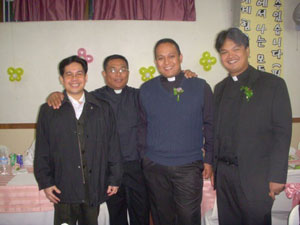
In the course of our training and education, all Columban seminarians participate in FMA, or first missionary assignment. I set off for Wuhan, China, with two other FMA students, Alito de los Santos from the Philippines and Tae-Moon Kwon from Korea.
Wuhan is a booming city in central China. After our arrival, we found that in China, parents must be residents of the city in order for their children to be registered in a regular school within the city. Otherwise, if someone is not officially a resident of the city but just lives and works there, the children must go to private schools which are often of much poorer quality than the city schools.
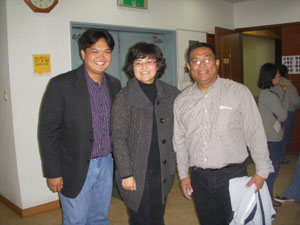
In Wuhan, one of our weekly ministries was teaching English in a private middle school that caters to the children of internal migrant workers, that is, workers from outside the city. All the students come from very poor, working families. They were from villages quite far from Wuhan. When their parents come to the city they work as janitors, factory workers, taxi drivers and at other blue-collar jobs. They are not official residents of the city of Wuhan.
We were introduced to this school by a Catholic Sister whose community was founded by Bishop Edward Galvin, the co-founder, with Fr John Blowick, of the Missionary Society of St Columban. Hanyang Cathedral, where the Sisters live, is not far from the school. I liked the idea of teaching at this private school because it served those who are marginalized within Chinese society. The migrants and their children do not have many opportunities within the wider society. When we presented ourselves, we were hired immediately as the principal/owner of the school was very happy to have foreigners teach in his school for free.
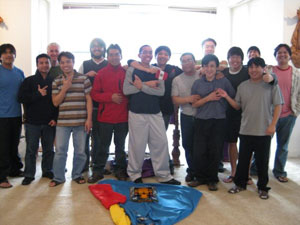
Tuition at the school is minimal in order to make it affordable to the migrant community. Therefore, teachers’ salaries are meager as well. The low wages cannot compete with the better paying city schools, and the private schools do not attract very many, or well trained teachers. The quality of education at the private schools is directly related to the low wages of the teachers and the minimal tuition. Simply stated, the schools do the best they can with what they have, which is not very much. In fact, the principal told us that during the previous year only two students from a class of approximately twenty students were able to go to college. Furthermore, he said that most of the students at the school end up working as helpers in small restaurants or as factory workers rather than pursuing higher education.
The students in my ninth grade class were around fourteen years old. Since it was my first time to teach English, I wanted to prepare very well. When I took the assignment, the principal told me that the focus of the curriculum would be on listening comprehension and speaking. Unfortunately, when I went to my first class I discovered that the students could not speak any English at all.
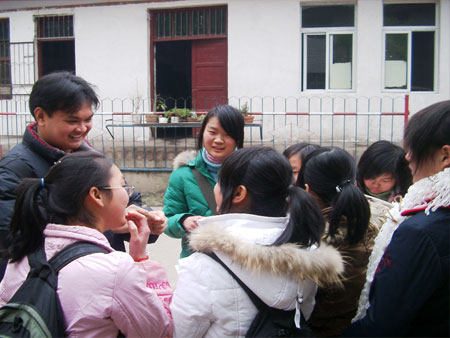
Worse yet, the teacher who had been instructing the class could not speak English either. That meant I had to start from scratch. I bought books and tapes that I thought would help me in this ministry. Every week I would make up conversations for them to learn, think of things to make the class more interesting and prepare handouts and lesson plans. However, many of my students were not interested in learning English. A number of them would be sleeping in class, and I tried to understand why. I believed that perhaps they would tell themselves, ‘What’s the point of learning English when at the end of school, I end up nowhere and won’t be able to use it anyway? Why should I study if I don’t need to speak English to become a taxi driver or a factory worker or a janitor?’ I don’t know if that was the case, or if they were teenagers who weren’t getting enough sleep at night due to work or family obligations. I sincerely hoped that they would continue with their education.
Working and doing ministry in China for my FMA has been a wonderful experience. It opened my eyes to numerous and various forms of ministry. Since missionaries are not allowed to engage in public pastoral work in China, we had to assess and initiate things independently, or with the help of friends, look for pastoral placements. And that’s what we did when we applied to teach English at the private school. Working there opened our eyes to the ‘other side’ of China’s economic success. While many Chinese people are enjoying financial wealth, our students and their families are not. In some families, the parents work all week and are home only during weekends. For some students whose parents are gone during the working week, living with grandparents is an option. Those without grandparents must live alone.
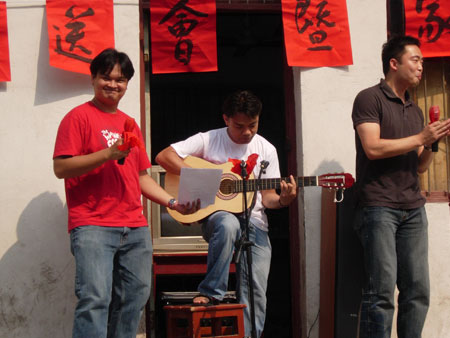
My students are marginalized in Chinese society. They are not welcome in regular schools. Their opportunities are curtailed by the poverty in which they live. When I saw their situation, what came to mind were the opening lines of the Vatican II document, Gaudium et Spes, which says ‘The joys and the hopes, the griefs and the anxieties of the men of this age, especially those who are poor or in any way afflicted, these are the joys and hopes, the griefs and anxieties of the followers of Christ (GS 1)’. Being a follower of Christ, I thought that I could contribute something to the students there. When I was allowed to teach in the private school, I really prepared well for my classes. I wanted the students to learn English so that they would be able to continue studying even after high school, as knowledge of the English language is required for college. Hopefully they will have better opportunities in the future with a foundation in the language.
Working at the school is not just about teaching English to the students. It is also about being with them and listening to their stories, what makes them happy and sad, their fears and hopes for the future. Even if some of the students are not interested in the class, their stories and the opportunity to be with them are reason enough for me to keep going back each week.
Following his first missionary assignment, Andrei O. Paz was ordained a deacon in Chicago. He has since returned to the Philippines to minister for a period as a deacon before ordination to the priesthood.
You may email Fr Andrei at andrei_pakner@yahoo.com
